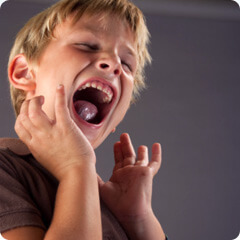Tourette's Syndrome
 Tourette's syndrome is a neurological condition that usually begins in early childhood and manifests itself with multiple vocal and motor tics, as well as a set of behavioral disorders that often dominate the overall clinical picture. To date, Tourette's syndrome is no longer as a rare enough disease, as it is diagnosed in approximately one hundredth child
Tourette's syndrome is a neurological condition that usually begins in early childhood and manifests itself with multiple vocal and motor tics, as well as a set of behavioral disorders that often dominate the overall clinical picture. To date, Tourette's syndrome is no longer as a rare enough disease, as it is diagnosed in approximately one hundredth child
Tourette's syndrome causes the onset of
What exactly causes a child's development of this condition to date is not completely understood, but most specialistsMake an emphasis on the genetic origin of this syndrome. In addition, it was noted that the use of powerful drug therapy( especially neurostimulants) of neuroses in children, often leads to the lightning development of Tourette's syndrome. Also for reasons that increase the risk of this syndrome include increased psycho-emotional stress, deterioration of the ecological situation;Smoking and drinking alcohol by the mother during breastfeeding and throughout pregnancy;Insufficient supply of blood and oxygen at birth;Autoimmune diseases, low birth weight, prematurity. In addition, there is confirmed evidence that streptococcal infection can lead to the development of turetism and tics.
So, it can be summarized that Tourette's syndrome is an unclear etiology of a neurological disease that can be triggered by any internal and external factors.
Tourette's syndrome symptoms
In most cases, this disease begins to manifest itself in 5-6 years of age with the appearance of vocal( panting, Whistling, coughing, grunting, screaming) or motor( twitching, grimace) tics. Ticks can both alternate and appear simultaneously. According to statistical data, about 10% of children with Tourette's syndrome develop various verbal disorders: Palilalia( a painful need to repeat certain sentences or individual words), echolalia( obsessive repetition of sounds, syllables or words), coprolalia( vocal ticks accompanied by obscene abusive words).
Typical for tics is the suddenness of occurrence and the speed of their implementation. Attempts to contain ticks by effort of will usually do not succeed. All movements in their manifestations are of the same type( intermittent, fast and sharp).Due to the lack of control on these sudden movements by the patients, it is possible to cause serious injuries. Due to the fact that patients are well aware of the inadequacy and unacceptability of their behavior, often they have secondary mental disorders, expressed in depressive states, avoiding contacts with people and low self-esteem. Particularly uncomfortable people with Tourette's syndrome feel in public places, as with emotional stress tics intensify, and surrounding people not knowing the full background of what is happening and not guessing about their illness, treat them quite hostilely
Tourette's syndrome diagnosis
Since children with this syndromeDevelop according to their age, and their emotional, mental and mental development does not differ from normal ones - a survey that is based only on the characteristics of the available rasstrasoperatio ns and on the basis of history does not bring the desired results.
All of the above suggests that the diagnosis of Tourette's syndrome requires the child, his parents and the treating doctor to scrupulously monitor the full picture of everything that happens, so that after collecting the maximum facts and data, the psychoneurologist could refute or confirm the diagnosis
Tourette's syndrome treatment
Psychological help and emotional support are the main elements in the treatment of Tourette's syndrome. Beginning in childhood, this disease can manifest itself throughout the rest of life, but with age, the symptoms are somewhat smoothed, as patients learn to avoid unpleasant situations that become a catalyst for relapse. In the vast majority of cases( with the exception of generalized tics), Tourette's syndrome does not require active medical intervention.
In the case of severe complications in the form of permanent hyperkinesis, generalized tics, difficulties or total inability to control tics - Tourette's syndrome requires drug and psychotherapy. Treatment with medication( often with neuroleptics or / and a-adrenergic receptors) reduces emotional tension and irritability, and also allows to weaken the severity of tics to some extent.
More articles on the topic:
1. Anorexia nervosa 2. Bulimia



